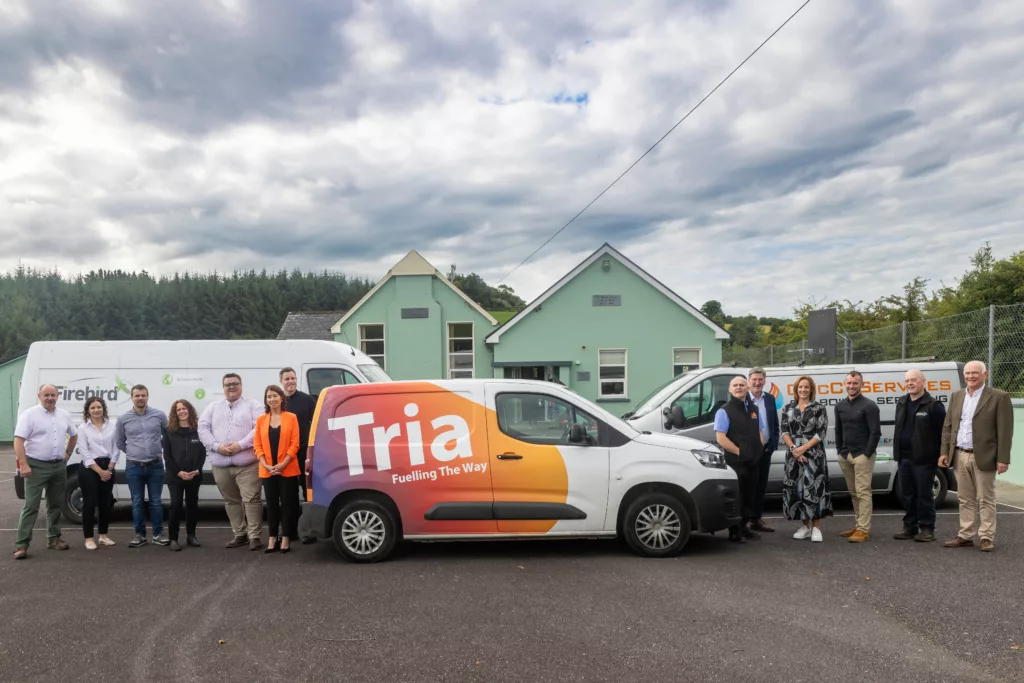25 August 2023
By Roger L Kennedy
tom@TheCork.ie
Firebird, market leader and manufacturer of high-performance heating systems, has developed a solution that could see domestic and commercial buildings in rural Ireland reduce their C02 emissions by 90%.

Pictured (From left) Michael Kirby, Tria, Jill Turner and Cal McCarthy Carbery Plastics, Lenneke Willems, Firebird, Pat Murnane, Patrick Kirby and Marie Lordan, Tria, Concubhar Mc Carthy, CMcC Services, Mark Doyle, Firebird, Helena Dinnen and Liam Cotter, St.Enda’s N.S, Michael Riordan Firebird and Gerry Treacy, OFTEC.
With its 800,000 oil fired boilers, Ireland is at a critical juncture in its efforts to transition towards a more sustainable energy future. Many buildings with oil fired boilers are not suitable for retrofitting, and the current grants available do not make sustainability affordable for many households. To address this issue, Firebird has developed a new range of certified Hydrotreated Vegetable Oil (HVO) boilers that can serve as a drop-in replacement for conventional oil-fired boilers.
The recent installation of a Firebird HVO boiler in a West Cork school showcases the capabilities of this innovative technology. The installation was carried out by Firebird’s skilled Service Engineer, Concubhar McCarthy of CMcC Services, who brought his expertise to the project, ensuring a seamless transition in the school’s heating system. St. Enda’s National School in Kilnadur, Dunmanway had been previously relying on the efficiency of a 20 year old boiler, installed in 2003. Over the past two years, Concubhar had been servicing the ageing boiler, but it became clear that the system had efficiency and safety issues. The school, with its 28 students and three teachers, experienced considerable heat loss due to the close proximity of the pipes to the ground, equivalent to the loss of three radiators’ worth of heat, over the distance from the boiler to the school.
Realising the seriousness of the situation, Concubhar promptly assessed the boiler’s condition and safety. The findings revealed fire hazards and risks related to the tank and electric cables. Concubhar shared the report with the school’s principal, Liam Cotter, seeking advice on the best heating system for the school’s high-ceilinged structure.
After thorough consideration and consultation with Firebird’s experts, it was decided that an air to water heating system wouldn’t be suitable due to the building’s structure and the Firebird HVO boiler offered the ideal solution. Liam Cotter, expressing his satisfaction with the decision to upgrade to a Firebird HVO boiler, said, “We are thrilled with the solution Concubhar offered, it made perfect sense for our situation. Given the age of the building built in 1865, we didn’t have the budget for an expensive retrofit, however as a Green School, we are always eager to find ways to reduce our carbon footprint, and the HVO boiler is another significant step forward for us.”
Commenting on the successful installation, Concubhar McCarthy stated, “We are proud to have partnered with Firebird on this project and to educate more people about the benefits of HVO as an affordable solution to reducing carbon emissions. The HVO ready 35kW Firebird Popular boiler, known for its exceptional efficiency, proved to be more than capable of efficiently heating the entire school. Its CO2 emissions have been reduced dramatically, making it significantly more environmentally friendly than the previous boiler.”
The installation process involved separating the boiler and oil tank which are now housed behind fireproof walls and doors, ensuring full compliance with OFTEC standard building regulations. The heating system boasts an efficiency feature of a Tigerloop, allowing for easy self-bleeding in the event of fuel going down. Also, for safety precautions, a carbon monoxide monitor is installed in the boiler room, providing an extra layer of safety by automatically cutting off the boiler in case of carbon monoxide rise.
Michael Riordan who works in the research and development department of Firebird was on-hand throughout the course of the project to provide his expertise on the boiler and the install. Speaking about the project’s success, Michael said, “The Firebird HVO boiler is designed with a commitment to efficiency and sustainability, and we are thrilled to see it making a real difference in the community and future generations.”
250306 L
